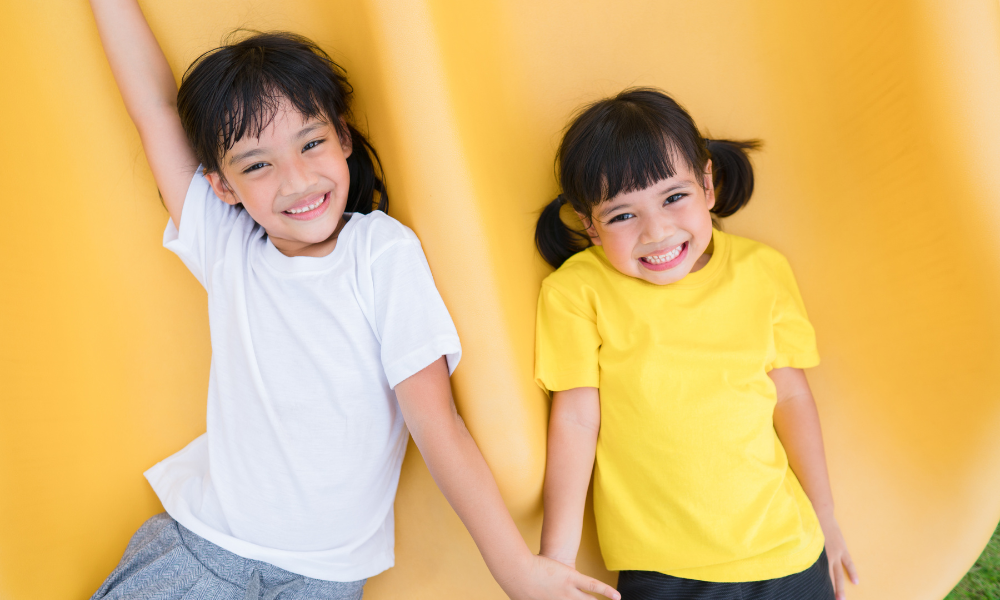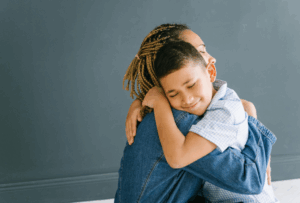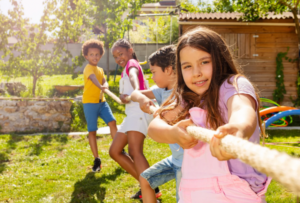By Karen Conley, President, CEO and founder of Charity for Change
Why do we need kindness in the classroom?
Kindness holds immense power in shaping the world. Within the Charity for Change curriculum for children, we define kindness as “bringing happiness to others by helping or being nice.” It goes beyond simple acts of benevolence. Kindness encompasses empathy, compassion, and a genuine concern for others. In this article, I invite you to explore why teaching children kindness is crucial both for the individual child and society and to remember your own childhood!
The Foundation of a Compassionate Society
Kindness lays the foundation for a more inclusive and compassionate society. Children who learn to treat others with respect and empathy contribute to creating a harmonious community. A study by the University of California, Berkeley, found that children who receive lessons in kindness and empathy show increased cooperation and prosocial behavior, ultimately fostering a more supportive social environment (Hoffman, 2015).
Enhancing Children’s Well-being
Helping children develop kindness equips them with valuable emotional tools to positively impact their mental well-being. According to a report from the World Health Organization (2019), children who engage in acts of kindness demonstrate many positive results.
The Benefits of Kindness on Children’s Well-being
- lower levels of stress
- less anxiety
- less depression
- higher levels of self-esteem
- a more positive outlook on life
Empathy: The Core of Kindness
Empathy, a cornerstone of kindness, is the ability to understand and share the feelings of others. Research by the Greater Good Science Center at the University of California, Berkeley, reveals that when children are taught to recognize and validate the emotions of their peers, they develop stronger interpersonal skills and form deeper, more meaningful connections (Ruffman, 2019). Kindness and empathy empower kids to navigate social interactions better and develop friendships. We can all remember how important it was to have friends in school. Friends helped us feel accepted, have fun, and enjoy being at school. Conversely, experiences of loneliness or exclusion were painful and difficult.
When Mr. Fred Rodgers appeared on the Oprah Winfrey Show, Oprah asked him, “What do you think is the biggest mistake parents make in raising their children?” Mr. Rogers replied, “Not to remember their own childhood. I think that the best thing that we can do is to think about what it was like for us and know what our children are going through (The Motivation Hub, 2023).”
I imagine most of us recall a time from our school days when we felt lonely or lacking friends. A whole school year might have passed painfully when others left us out or picked us last for teams. Remember how hard that was? Research shows that loneliness can harm a child’s mental health and academic performance. Prolonged loneliness can cause increased stress, anxiety and even depression (Cacioppo & Hawkley, 2009).
Beyond just teaching academics, nurturing children’s ability to form positive social connections is vital to a child’s development. The Surgeon General’s 2023 Advisory on The Healing Effects of Social Connection cited loneliness as a major public health concern:
Social connection is as essential to our long-term survival as food and water. But today, loneliness is more widespread than other major health issues in the U.S. Our epidemic of loneliness and isolation is a major public health concern (U.S. Surgeon General, 2023).
This national advisory named loneliness and isolation an epidemic! On the other hand, the advisory cited extensive research showing that social connection significantly improves the health and well-being of all individuals. Social connection prevents premature death, predicts better health, eases stress and impacts educational and economic achievement. A socially connected community enjoys better population-level health, greater economic prosperity and reduced crime ((U.S. Surgeon General, 2023).
To address the epidemic of loneliness, the advisory called for developing a national strategy to increase social connection. It outlined what schools and education departments can do, and we must heed the call. The tools needed for social connection start to form—or not develop—at a very young age.
What Schools Can Do to Increase Social Connection
- Develop a strategic plan for school connectedness and social skills with benchmark tracking
- Build social connection into the curricula
- Implement socially based educational techniques
- Create a supportive school environment (U.S. Surgeon General, 2023)
Charity for Change is a curriculum that helps children develop traits like kindness, empathy and resiliency, which facilitate social connection. Charity for Change aims to cultivate confident and compassionate children who become successful learners, contribute to their schools and communities, and participate in society as ethical, empathetic, and resilient citizens. Our goal is for every child in the U.S. to have access to this curriculum in school or after-school programs. I believe it’s vital for children’s well-being and society’s future (and the Surgeon General does, too!)
Kindness in the Classroom Reduces Bullying
A study published in the Journal of School Violence (2018) showed that schools implementing kindness-centered programs experienced a significant reduction in incidents of bullying compared to those without such programs (Boulton, 2018). By promoting a culture of kindness, schools create a safer and more nurturing environment for all students. With the alarming uptick in school shootings, kindness, and character education can play an instrumental role in keeping our children safe.
Fostering a Sense of Responsibility
Teaching kindness in the classroom instills a sense of responsibility in children towards their communities and the world. Acts of kindness, whether big or small, demonstrate that individuals have the power to make a positive impact. This realization encourages children to take initiative and become proactive contributors to their classroom, school, family, and community.
Teaching children kindness is a powerful antidote in a world that sometimes seems divided and harsh. It lays the groundwork for a more inclusive, empathetic, and harmonious society. By nurturing kindness, we equip children with the emotional intelligence and social skills needed to thrive in an interconnected world. Let us invest in a better future by sowing the seeds of kindness in the hearts of our children.
Learn more about the Charity for Change program and how you can purchase the program for your students.

Written by Karen Conley
President, CEO and founder of Charity for Change
References:
Boulton, M. J., (2018). Effectiveness of a school-based kindness program on aggressive behaviors: A randomized controlled trial. Journal of School Violence, 17(6), 672–684.
Cacioppo, J. T., & Hawkley, L. C. (2009). Perceived social isolation and cognition. Trends in Cognitive Sciences, 13(10), 447-454.
Hoffman, M. L., (2015). Training children to be more caring, respectful, and emotionally literate: A randomized controlled trial. Journal of School Psychology, 53(5), 393-408.
Ruffman, T., (2019). Roots of Empathy: Evidence-based programs to reduce aggression and promote prosocial behavior in children. In The Oxford Handbook of Prosocial Behavior. Oxford University Press.
The Motivation Hive (2023). Biggest Mistakes Parents Make [Video]. Retrieved from https://www.youtube.com/watch?v=MvYs-4HOnMk
The U.S. Surgeon General. (2023). Our Epidemic of Loneliness and Isolation: The U.S. Surgeon General’s Advisory on the Healing Effects of Social Connection and Community. Retrieved from https://www.hhs.gov/surgeongeneral/priorities/connection/index.html#advisory
World Health Organization. (2019). Promoting mental health: Concepts, emerging evidence, practice (Summary report). Retrieved from https://www.who.int/mental_health/evidence/en/promoting_mhh.pdf





